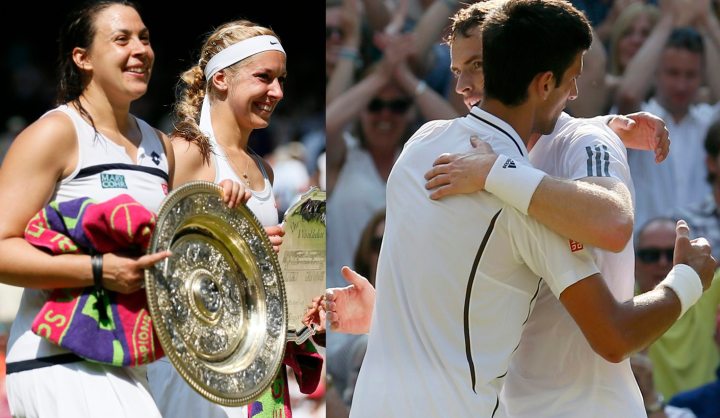Sport
Tennis: When the loneliest place in the world is Centre Court

Both of Wimbledon’s finals over the weekend were knitted with emotion. Sabine Lisicki couldn’t hold back her tears, and Andy Murray was beaming after bagging the trophy. It’s been an endearing tournament, but when the players are out on Centre Court, it seems there’s no place more lonely. By ANTOINETTE MULLER.
Two Wimbledon finals, two similar narratives. Both the finals at the All England Club over the weekend encompassed the loneliness of playing an individual sport. Even when the world’s eyeballs are fixed on you, when some of the most influential in the country are there to watch you – they can’t help you.
Those who fight it out on the sports battlefield might resent that loneliness, but for those who watch, it is different. The tears, frustration and eventually glory of Wimbledon over the past two weeks served as a wonderful reminder of why sport can be so great. It has been an enthralling few weeks, even for those with nothing more than a passing interest in tennis. Wimbledon has been trying to increase its accessibility, and for about R300, the regular pundit can get access to the grass bank. That won’t allow access to any of the fancy courts, but you can watch the game in the outdoors, on a bank with thousands of others.
The 2013 edition of Wimbledon has been the year of the underdog and upset. It’s been wrought with emotion and endearing in its simplicity. It all culminated over the weekend with the two finals, when emotions wrestled composure from some of the world’s best players.
On Saturday there was the match between Marion Bartoli and Sabine Lisicki. One, a valiant conqueror in her own right, having felled Serene Williams and scrapped her way to the final. The other, the contrast of what is perceived to be athletic.
Bartoli and Lisicki battled it out and it was the Frenchwoman who triumphed, efficiently and ruthlessly, as Lisicki combusted. Even with a 15,000-strong crowd behind her, Lisicki couldn’t have looked more lonely. Despite looking composed at the start, by the time the German was a set down and 1-3 down in the second, she started to unravel.
For somebody with a serve so powerful it set up Williams’ exit and a reputation for being headstrong, Lisicki got too swept up in the moment. By the time she was defeated, 6-1 6-4, she had gained some composure, but the tears came blooding back during the presentation. Even with all the support in the world, Lisicki had to fight that battle out on centre court on her own. She had to hold back her emotions on her ace. With a raging duel slipping away from her, she could look to those in the players’ box and acknowledge them with a nod, but she was still dead alone in the middle of the All England Club.
Similarly, on Sunday, when Andy Murray and Novak Djokovic battled it out on the grass court, their battle was desolate. Through slips, serves and sweltering heat, emotions often got the better of the two. Whether it was Djokovic moaning or Murray clenching some sort of body part, it was from-the-heart stuff.
Through the long rallies and being on the brink of a fight-back, both men had their ups and downs. Smiling isn’t really Murray’s forte, but there was a wry smile from the Scotsman when he cradled the trophy at the end. By the time he had got down on his knees, Murray had started to show some pent-up emotion. Beating Djokovic in three straight sets was a result very few could have predicted.
Momentum shifted like a pendulum, and the men’s frustration was always visible.
While sport has evolved to become far more than a spectacle, it still retains that in its essence. It is one of the many reasons why sport is so enthralling. It’s why, even when one cares or knows little about tennis, a contest like Wimbledon can be enchanting. Those with bodies chiseled to endure ,and achieve more than those sitting on the couch ever will, are entertainers on one of the world’s biggest stages. Their victories, especially when it’s by somebody who challenges our perceptions about what an athlete is – like Bartoli – can inspire generations. Similarly, the failures makes them human.
Tennis has seen plenty of emotion in the last few years. Once upon a time, after losing to Roger Federer, Murray simply said: “I can cry like you; pity I can’t play like you.”
That quote sums up the magic of sport. We might not be able to play like them, but boy, we can cry like them. DM
Photo: Marion Bartoli of France (L) holds her winners trophy, the Venus Rosewater Dish, after defeating Sabine Lisicki of Germany (R) in their women’s singles final tennis match at the Wimbledon Tennis Championships, in London July 6, 2013. REUTERS/Stefan Wermuth (L) and Andy Murray of Britain (R) embraces Novak Djokovic of Serbia after defeating him in their men’s singles final tennis match at the Wimbledon Tennis Championships, in London July 7, 2013. REUTERS/Stefan Wermuth



















 Become an Insider
Become an Insider